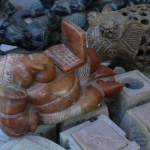Mohammad Bin Tughlaq was the son of Ghiyas ud din and came to the throne in 1325. Mohammad bin Tughlaq is known as a wise fool for two actions that seemed intelligent but utterly failed. So fraught they were with inconsistencies that their implementation left him weaker than before. Of course, they never solved the questions he had wanted to address in the first place either!
Here are the two of his most famous actions:
Delhi to Deogiri Move
In order to improve administration of the southern parts of his Empire after winning in Deccan, Bin Tughlaq moved the capital from Delhi to Deogiri in the Deccan in the early part of his reign, renaming the city Daulatabad. Instead of moving just his goverment offices there, he, in his infinite wisdom, wanted to forcibily move the entire population of Delhi to the new capital. But the plan failed due to inadequate arrangements in Deogiri and the capital had to be shifted back again to Delhi after two years. A vast amount of the population died during the moves due to the inadequate travel arrangements. It is said that Delhi was a ghost town for years after the move back.
Copper and Brass Coins
He then had the novel idea of introducing for the first time in India ( and perhaps the world )the token currency, using brass and copper coins rather than silver.Very few people exchanged their gold/silver coins for the new copper ones. The new currency was also easy to forge so their were heavy losses due to this. After the plan failed there were heaps of copper coins lying around the royal offices for years.
The moral of the story is that just as at the level of individuals, if the state also takes the decisions without adequate thought of its consequences and the peculiarity of the populace and the constituency they serve, the results will be disastorous!
Muslim Census in Indian Army
Recently, Government is planning on doing census in the Indian Army of the Muslims – based on Sachar Committee report, which itself is based on a book by an MIT professor Omar Khalidi “Khakhi and Ethnic Violence”. The premise is that the Muslims are not properly represented in the Indian Army – as far as numbers and proportions is concerned.
This has prompted a move to create a ‘reservation’ policy for Muslims in India’s Army! Which is rather facetious!! In a service where sheer strength of will and zero-mistake-tolerance is needed at the moment of fight.. we will now have to recruit based NOT on caliber of a soldier, but based on his RELIGION???!!
Indian Army, is by far the most cohesive force and most honest – relatively of course – of the Indian departments. And this is because the secular principles of the British Army are still ingrained. It is a practice that ALL the soldiers in the Sikh LI follow the Sikh traditions – irrespective of their religion. The “religion” of the regiment is the “religion” of its soldiers.
It is fairly common in the Indian Army to have Muslim Colonel leading prayers on a Hindu festival like Diwali and for a Sikh or Hindu Colonel to lead prayers on a Muslim festival like Id-ul-Fitr.
There is NO denying that Muslims in India need to succeed for the country to rise up. But the necessary intervention HAS to be at the SOURCE of the problem – the education system and incentives to see that ordinary Muslim kid goes through a normal schooling and gets the necessary wherewithal to compete in this world.
To introduce a program where religion is the raison d’etre for a person’s recruitment would severely compromise the feeling of camaraderie and secularism that exists between different sections of the Indian Army – for it would be tough for the soldiers to forget that the Colonel is standing there in his position NOT because he is the finest soldier amongst them, but because he bows to a certain God!
That, will be the end of Indian security system.
Mohammad Bin Tughlaq was succeeded by Feroz Shah Tughlaq who was militarily weak. After Feroz the Tughlaq dynasty started to fade out and there were no able leaders. After Feroz Shah’s death in 1388, the dynasty was almost over within 10 years.















